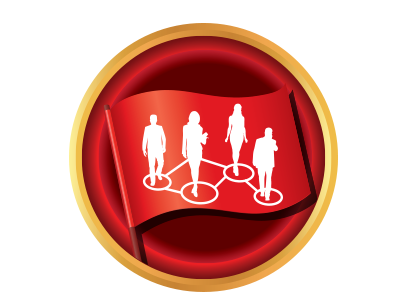According to the World Economic Forum’s Future of Jobs Report, emotional intelligence (EI) will be among the Top 10 most desirable job skills in 2020. Why are companies placing such a premium on this talent, compared to IQ or even technical skills?
One of the most common definitions of EI is “the ability to recognize, differentiate and manage our emotions and the emotions of others in our environment.”
For much of the 20th century, we assumed that the person who was the smartest, or had the highest IQ, would be the most likely to succeed. That’s what everyone thought when I went to school. However, after attending our high school reunions, many of us realized this wasn’t always the case.
“When dealing with people, let us remember we are not dealing with creatures of logic. We are dealing with creatures of emotion.”
—DALE CARNEGIE, How to Win Friends and Influence PeopleOf course, having a high IQ—receiving a high score on an intelligence test—is still a good thing. But social scientists now confirm that strong social skills are a key element to success and that humans are born with the potential for EI. This inborn capacity may be damaged or highly developed, depending on a person’s life circumstances and experiences. However, the wonderful thing about EI is that with work and awareness, we can rebuild or enhance emotional intelligence regardless of our backgrounds.
In 1990, two American professors, Peter Salovey and John Mayer, coined the term “emotional intelligence” to identify a type of self-awareness they believed had greater influence on human behavior and life outcomes than pure brain power.

In 1995, science journalist Daniel Goleman expanded on the concept in his seminal work, Emotional Intelligence: Why It Can Matter More than IQ. The book was a fixture on bestseller lists for nearly two years and was translated into 40 languages. Among other insights, Goleman notes three levels of EI: (1) recognizing the emotions of others; (2) feeling what others feel; and (3) understanding others’ motivations and emotions so well that a respectful, trusting connection develops.
This book launched my life mission to nurture my own emotional intelligence and help others develop theirs. My “aha” moment came when I read a short passage from Goleman’s book that says, in essence, “your intelligence can come to naught when emotions hold sway.” At that moment I knew I’d discovered something profound and powerful that would forever change my life. I read everything I could about EI and strayed far from my comfort zone in my ways of thinking and interacting with people. I constantly grew and changed. Eventually I wrote a book called The Other Kind of Smart: Simple Ways to Boost Your Emotional Intelligence for Greater Personal Effectiveness and Success. It has been translated into Vietnamese, Arabic and Chinese.
A few years ago, I attended the Toastmasters World Championship of Public Speaking with a friend. She told me that in order to get her vote, the speaker would have to make her cry. The winning speaker did just that. We agreed that the finalists delivered excellent speeches. They were compelling and well crafted, with all the right pauses, voice variance, body language and emphasis in the right areas. Only the winner, we decided, was able to make the kind of “emotional connection” to move the judges to choose her.
A speaker doesn’t have to generate only pathos to connect emotionally with the audience; a humorous presentation that sparks laughter also resonates powerfully with listeners.

When people listen to the words we speak, they react to and are influenced by the emotions the message evokes. Emotions are the building blocks that EI leaders and teams use to create rapport, common goals and connections that can last well beyond the initial contact. In fact, Harvard recently released results from a 75-year study, looking for the single most important and reliable predictor of happiness. The answer? Our connections with others—one of the foundational principles of both EI and Toastmasters. A great deal of research has linked EI with workplace success, leading many companies to seek this talent over more tangible skills.
Begin with Empathy
Empathy is the essence of emotional intelligence and is the biggest single leadership skill needed in today’s world, according to studies by Development Dimensions International. EI is also marked by listening skills, respectful behavior, grace under pressure, solid judgment and an open mind to feedback.
“The EI-savvy can simply get along with others and work in productive teams.”
Whether in our workplace, in organizations or in personal relationships, when we feel we are understood, valued and appreciated, we want to contribute and stay in that environment. That feeling keeps us motivated to work toward something beyond our own immediate individual needs. It increases engagement among team members and provides a sense of belonging.
Members of winning sports teams happily congratulate their teammates when one of them scores a goal or achieves a milestone. They also are quick to express concern when a teammate is injured, in trouble or performing poorly. This level of concern allows team members to take risks and push their limits, knowing that if they fail, their fellow members will still be supportive.
The Art of Listening
“I like to listen. I have learned a great deal from listening carefully. Most people never listen,” wrote Ernest Hemingway. To connect with people effectively requires strong listening skills. Everyone has a desire to be heard. Good leaders recognize this need and ensure that people feel heard and appreciated.
“Empathy is one of the most important, if not the most important, attributes for effective leadership.”
Here are five ways to boost listening skills.
Be Fully Present. Put down the phone and don’t try to formulate a response while someone else is talking. If another matter requires your attention, let others know when you’ll be able to give your them your full attention. Good listeners see every conversation as a lesson. They become astute listeners because they don’t want to miss out.
Put Yourself in Their Shoes. Great listeners get out of themselves and try to imagine why another person may be thinking or why they’re feeling a certain way. As the late leadership expert Stephen Covey said, “Seek first to understand, then to be understood.”
Let the Speaker Know You Understood. Pick up key points. I have attention deficit disorder so listening can be a challenge. I always catch a few major points that I can play back to the listener to demonstrate I was paying attention. If I didn’t understand something, I will ask. The important thing is that the speaker knows I made an honest effort to pay attention.
“Everyone has a desire to be heard. Good leaders recognize this...and ensure people feel heard and appreciated.”
Practice Active Listening. Imagine you are going to be tested on how well you heard another speaker. You can practice this with friends and family. Have one person speak and you remain completely focused on what is being said. You will notice it is much easier to focus on the speaker when you aren’t thinking of how to respond.
Curate Curiosity. Curious people see all conversations as learning opportunities. Every person they meet has something to teach. We should all try to adopt this approach. When we are curious about what people are saying, we tend to listen more closely.
People look to leaders to determine what is valued and important to the organization. If they sense their leaders are concerned about all aspects of people’s lives, they will want to reciprocate and go above and beyond what is expected of them.
A high IQ is a wonderful thing, but emotional intelligence is also highly valuable in life. It enables us to understand ourselves, to connect with others, and to excel as a communicator and leader.
Harvey Deutschendorf who wrote The Other Kind of Smart, is an EI expert, speaker, contributor to Fast Company magazine and a columnist for HR Professionals magazine. Learn more at www.theotherkindofsmart.com




 Take the EI Quiz!
Take the EI Quiz!


